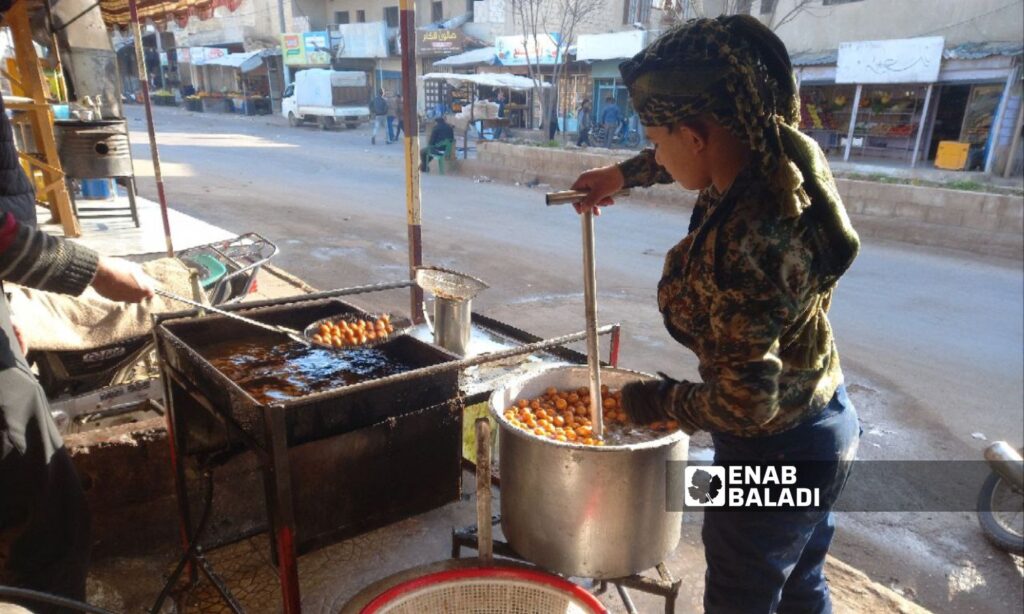In front of a small stand selling “Awameh” and “Mushabak” in the town of Muzayrib in Daraa’s western countryside, and after being urged by her daughter, Salam al-Mohammad took out 5000 Syrian pounds from her bag, requesting half a kilogram of “Awameh” from the seller, only to receive a small quantity that would not be enough for her family at home.
Al-Mohammad, 30 years old, settled for buying an ounce (250 grams) of “Awameh” after being surprised by its high price. She said, “Awameh and Mushabak, which have always been the desserts of the poor, are now among the most expensive sweets. They have joined the list of desserts becoming luxuries for most people.”
The prices of “Awameh” and “Mushabak” have risen in the markets of Daraa governorate in southern Syria due to the high cost of their ingredients, making them unaffordable for many low-income residents.
The price per kilogram of these sweets reached 25,000 Syrian pounds, compared to a price that did not exceed 10,000 pounds last winter.
“Awameh” and “Mushabak” are popular sweets that are in high demand during the winter season. They used to be known for their affordability and were sold through stands on the sidewalks.
“Awameh” or Luqaimat is a sweet Syrian dish consisting of small doughnut balls that are fried and then dipped in sugar syrup.
“Mushabak” is a sweet Syrian dessert that is crunchy on the outside and soft on the inside with a dough sort of similar to Awameh.
A store selling “Awameh” and “Mushabak” in Muzayrib town in Daraa’s western countryside – November 7, 2023 (Enab Baladi/Halim Muhammad)
Expensive ingredients
Several factors have contributed to the increase in the price of these sweets, including the rise in the price of vegetable oil, sugar, and gas.
Ahmad al-Fandi, a 25-year-old seller in a store that sells “Awameh” and “Mushabak” in rural Daraa, told Enab Baladi that the increase in the prices of “Awameh” is related to the rise in the prices of its ingredients, especially sugar, frying oil, and gas. These ingredients are needed for sweets in general, but “Awameh” requires large quantities of them.
The price of a kilogram of sugar reached 14,000 Syrian pounds, as it witnessed an increase that coincided with the fluctuations in the exchange rate of the Syrian pound against the US dollar, as sugar is mostly imported and is subject to exchange rate fluctuations.
The exchange rate of the US dollar reached 14,000 Syrian pounds, according to the S-P Today website, which specializes in currency prices.
On July 30 of last year, the Secretary-General of the Consumer Protection Association, Abdul Razzaq Habza, told the local newspaper Al-Watan that the pricing of sugar is done through the central price committee affiliated with the Ministry of Internal Trade and Consumer Protection after the importers provide their cost data.
Habza added that it is possible to submit exaggerated or underestimated costs to avoid taxes, pointing out that there are no controls that determine the price.
The seller explained that “Awameh” requires concentrated syrup, and each kilogram of syrup requires two and a half kilograms of sugar.
Unlike other sweets, “Awameh” requires a large amount of frying oil in its production, as the dough is fried in oil, and the price of a liter of oil has reached 25,000 Syrian pounds.
According to the seller, the frying oil needs to be constantly changed because prolonged use leads to the emergence of a burnt oil taste in “Awameh” and “Mushabak.”
The cost is not limited to sugar and frying oil; the price of flour has also increased, reaching 3,000 Syrian pounds per kilogram. The price of a gas cylinder in the local market has also risen to 175,000 Syrian pounds, compared to a price that did not exceed 60,000 pounds last September.
The seller added that his sales have decreased compared to previous years, as his customers now buy smaller quantities. He mentioned that what he used to sell in one day, he now sells over three days.
Meanwhile, another seller stated that all types of sweets are witnessing a decline in sales due to families’ efforts to secure basic food items, which have become unaffordable for the population.

